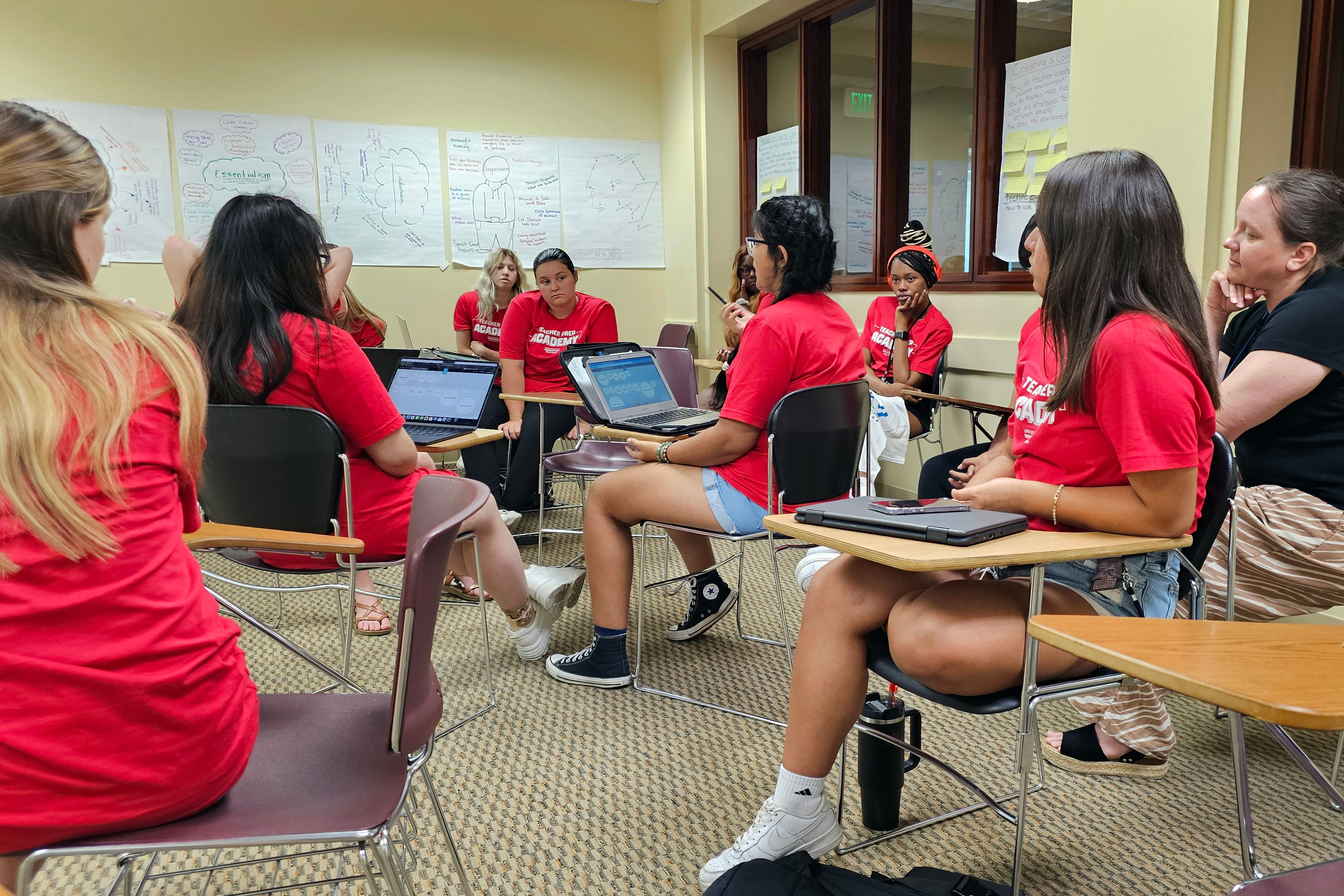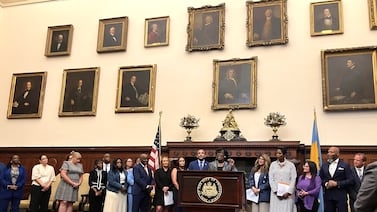Sign up for Chalkbeat Indiana’s free daily newsletter to keep up with Indianapolis Public Schools, Marion County’s township districts, and statewide education news.
Elley Kropp wasn’t sure at first if her family would approve of her becoming a teacher.
She knew she might make more money as a nurse or a cosmetologist. And she had faced challenges in school; in the eighth grade she was diagnosed with learning disabilities.
But the possibility of helping students like her drew her to the field of education. The final push came when her father, a plumber, gifted her tool caddies to repurpose for her future students’ supplies.
“Knowing I could be a teacher who helps a kid who’s struggling, I want to be that person for someone,” said Kropp, now an elementary education major at the University of Indianapolis School of Education.
Kropp started her teaching training in high school through the university’s Teacher Prep Academy, a free summer program now in its second year that lets high schoolers live on campus for a week and take a transferable dual credit course in education.
The academy seeks to address a core issue of Indiana’s teacher shortage: More teachers are retiring while fewer students are enrolling in teacher prep programs, resulting in a net decline in the number of teachers.
The need for more new educators comes as the state enacts sweeping changes to curriculum that will require more teachers to be trained in dual credit programs and reading science practices.
By connecting students to the profession in high school, the program hopes to put them on track to study teaching and eventually step into those open roles. The academy allows students who are interested in teaching to meet and bond, creating a supportive environment for would-be educators.
Getting young people to consider teaching
While the Indiana Department of Education doesn’t track teacher vacancies and open positions year over year, there were over 2,200 open teaching positions on the state’s teacher job board as of June 11, as well as over 600 open student support roles — numbers comparable to previous years.
Schools anecdotally report ongoing hiring challenges, especially in hard-to-fill subjects like career and technical education, science, and math.
The most recent state data shows that in 2022-23, there were 61,409 teachers teaching in a content area for which they’re licensed, down from 63,232 the year before.
A number of factors have dissuaded students from pursuing a teaching career, including the negative rhetoric directed at education, and concerns about pay, said Kelley Carnagua, coordinator of the Teacher Prep Academy, which is funded through a state grant.
The university is also using a portion of this grant on a marketing effort to change how students and their families view the teaching profession, Carnagua said, including sharing stories of the impact that educators have.
“Whatever path they choose, they have to get an education first,” Carnagua said.
Inside the Teacher Prep Academy
Some students are there to follow in the footsteps of a teacher who made a positive impact on their lives. MacKenzie McKinney, a rising junior in Clark-Pleasant schools, named her middle school choir director and her chemistry teacher as two of her inspirations.
Others want to change the educational experience for students who come after them, Kropp said. Kropp this year serves as a mentor to the high school students in the Teacher Prep Academy.
This year, the academy has enrolled 24 students from 11 school districts in central Indiana, who spent a week on campus in June.
They took field trips to an elementary school to help with summer school, as well as the Indianapolis Children’s Museum to talk about learning experiences outside the classroom.
Of all the experiences, students are usually most excited about classroom visits, where they can work with students on experiential lessons in science- and technology-related activities and garden clubs.
“That’s what lights their fire,” Carnagua said.
On a recent Thursday on campus, students were split into two classrooms — one discussing the external factors that affect schools, like communities and funding, and the other learning about what goes on inside the classroom.
In the latter, John Somers, director of graduate studies at the School of Education, walked students through the ABCs of behavior — antecedent, behavior, and consequence. One wanted to know: Do real teachers know about this?
“They do if they went through our program,” Somers said.
Students had designed posters about other topics they had covered that week, like multi-tiered systems of support, Maslow’s hierarchy of needs, and incorporating elements of hip-hop into pedagogy.
Anye’ Watson, a rising senior in Wayne Township schools, said she had seen those concepts put in practice in her own education, even if she didn’t yet know what they were called. What resonated with her was that good classroom relationships were at the heart of each lesson.
“It’s about building bonds,” Watson said.
Aleksandra Appleton covers Indiana education policy and writes about K-12 schools across the state. Contact her at aappleton@chalkbeat.org.







